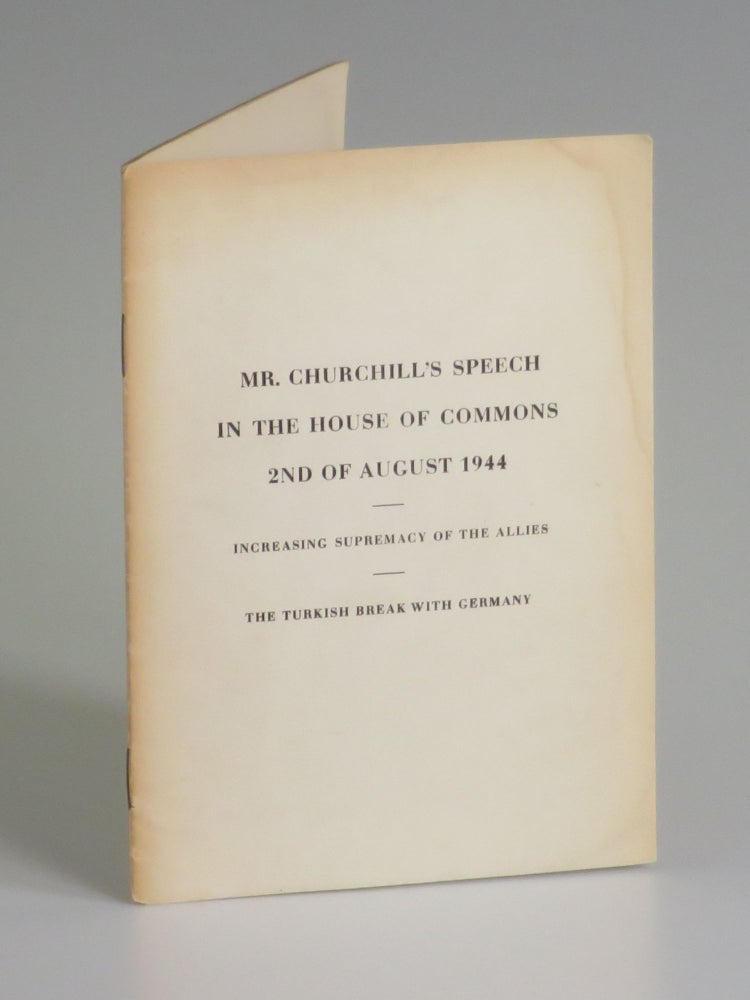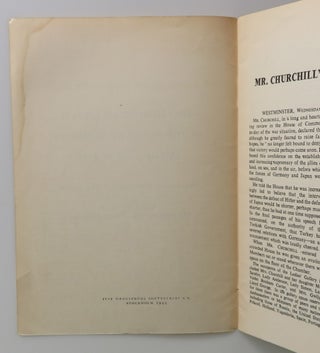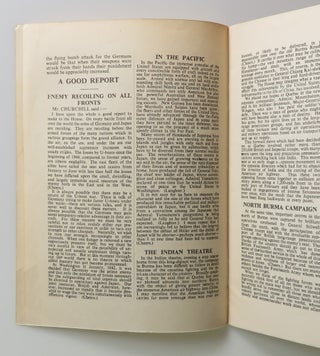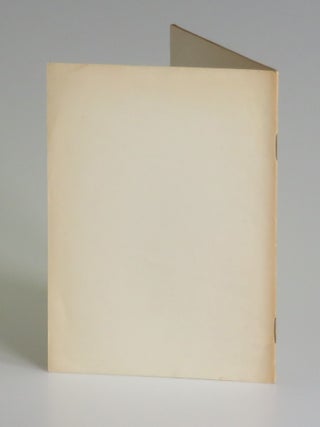Mr. Churchill's Speech in the House of Commons, 2nd of August 1944
Stockholm, Sweden: Ivar Haeggstroms Boktryckeri A.B., 1944. First Swedish (English-language) edition, only printing. Pamphlet. This unusual and scarce wartime item is the only printing of the Swedish (English-language) edition of Prime Minister Winston Churchill’s 2 August 1944 speech to the House of Commons on the war effort. Bound in wire-stitched paper wraps, the pamphlet measures 8.25 by 6 inches (21 x 15.2 cm). The contents are printed on 15 pages featuring dense type in two columns of up to 60 lines per column, liberally interspersed with subject headings in larger, bold font. Churchill’s Bibliographer, Ron Cohen, records only two stand-alone editions of this speech – this Swedish edition and the Berne British Legation edition – with no publication precedence assigned. Condition is very good. Both binding staples are firmly intact and the paper wraps are complete, with only modest age-toning and a hint of wear to the corners. Condition would be near fine if not for faint moisture stains to the upper fore edges of the covers. The contents are bright with no previous ownership marks or spotting.
Churchill's preeminence as a historical figure owes most to his indispensable leadership during the Second World War, when his soaring, trenchant, and defiant oratory sustained his countrymen and inspired the free world. Of Churchill, Edward R. Murrow said: "He mobilized the English language and sent it into battle." Churchill’s 2 August 1944 speech is a wartime exemplar, lengthy and broad in scope. The prospects for the outcome of the war had turned considerably more favorable for the allies, but the politics and compromises of alliance were in many ways as fraught, complex, and consequential as military exigencies. Moreover, the war was still far from won.
The last week of July had brought “much concern in the War Cabinet about the impending German V2 rocket attacks”. (Gilbert, VII, p.866) As testimony to this concern, Churchill’s speech dwelt at some length on the “flying bomb”, detailing its impacts, while simultaneously praising the resilience of Londoners and the overwhelming counter pressure of the Allied bombing campaign, ultimately using the V2 attacks as another psychological lever to motivate his people. Interestingly, Churchill was almost always mindful of distinguishing between the German people and the Nazis and envisioning a just and constructive peace even in the midst of bloodiest struggle. But the V2 must have struck a nerve, because neither distinction nor conciliation was on display: “The only result of the use of this indiscriminate weapon as far as they [the Germans] are concerned, will be that the severity of the punishment which they will receive after their weapons have been struck from their hands by our fighting men will be appreciably increased.”
Toward the end of his speech, Churchill also referenced the famous 20 July “Operation Valkyrie” bomb plot against Hitler by German Officers: “The highest personalities in the German Reich are murdering one another, or trying to, while the avenging armies of the allies close upon the doomed and ever-narrowing circle of their power.” Churchill closed his speech echoing the clarion calls of 1940: “Let us go, then, on to battle on every front, thrust forward every man who can be found, arm and equip the forces in bountiful supply, listen to no parley from the enemy, vie with our valiant allies to intensify the conflict, bear with unflinching fortitude whatever evils and blows we may receive, drive on through the storm now that it reaches its fury, with the same singleness of purpose and inflexibility of resolve as we showed to all the world when we were all alone.” Churchill then heeded his own exhortation. Churchill promptly returned to his Map Room, run by Captain Richard Pim, to find Pim listening to a wireless report of the speech. Churchill, eager to learn what information had come in while he was giving his speech, “sat down in his chair, and starting a fresh cigar said, ‘Now, Pim, tell me all about the war.’” (Pim, recollections of 2 August 1944).
Reference: Cohen A195.2. Item #006737
Price: $275.00




